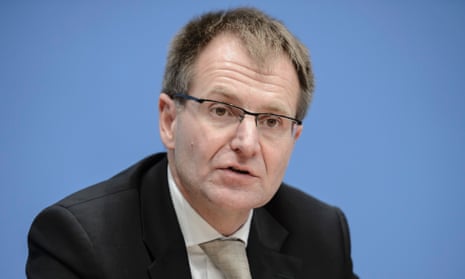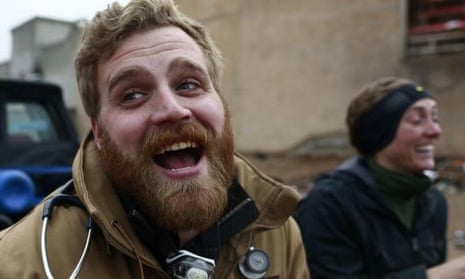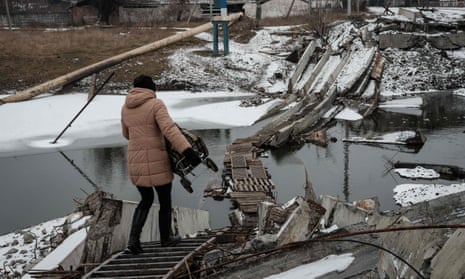Germany has war crimes evidence in 'three-digit range', says prosecutor
Germany has collected evidence of war crimes in Ukraine, the country’s prosecutor general said in a newspaper interview published on Saturday, adding that he saw a need for a judicial process at international level.
“Currently, for example, we are focusing on the mass killings in Bucha or attacks against Ukrainian civilian infrastructure,” Peter Frank told the Welt am Sonntag newspaper.
So far, prosecutors had pieces of evidence in the “three-digit range”, he added, without elaborating.
Reuters also reported that Ukraine and its western allies have accused Russian forces of committing atrocities in Bucha, a satellite town of Kyiv, soon after launching their invasion last February. Moscow has denied the charge. Russia has also targeted key infrastructure in Ukraine but denies deliberately targeting civilians.
Germany began collecting evidence in March 2022 to prosecute possible war crimes, including by interviewing Ukrainian refugees and evaluating publicly available information, Frank said, adding that German prosecutors were not yet investigating specific individuals.
We are preparing ourselves for a possible later court case - be it with us in Germany, be it with our foreign partners, be it before an international court.

Asked who should be tried, Frank said Russian state leaders and those implementing decisions at the highest military level should be held accountable.
Ukraine is pushing for the creation of a special tribunal to prosecute Russian military and political leaders it holds responsible for starting the war.
Key events Show key events only Please turn on JavaScript to use this feature
There has been no let-up in fighting in Bakhmut, the front line of a continuing battle between Ukrainian and Russian forces.
Throughout Friday morning Agence France-Presse journalists heard a steady exchange of small-arms fire and the pounding of mortar shells to and from Russian positions, the agency reported.
Pete Reed, a US humanitarian medic, was killed in the eastern Ukraine city when his evacuation vehicle was hit by a missile, according to Global Outreach Doctors, with whom he was working.
Reed was a former US Marine Corps rifleman who also worked as a paramedic, according to the organisation’s founder, Andrew Lustig.
Several other people were reportedly hurt in the strike.
A local man, Oleksandr Tkachenko, 65, said it was “clear” that the car, which was destroyed, was not a military target.
Residents trying to rescue the occupants had also come under attack, he added.

The international criminal court has launched its own investigation into alleged crimes against humanity and war crimes committed in Ukraine days after Russia’s invasion in February, but it does not have jurisdiction to prosecute aggression in Ukraine.
The European Commission chief, Ursula von der Leyen, who is visiting Kyiv, said on Thursday that an international centre for the prosecution of the crime of aggression in Ukraine would be set up in The Hague, Reuters reported.
Moscow rejects the war crimes allegations.
Germany has war crimes evidence in 'three-digit range', says prosecutor
Germany has collected evidence of war crimes in Ukraine, the country’s prosecutor general said in a newspaper interview published on Saturday, adding that he saw a need for a judicial process at international level.
“Currently, for example, we are focusing on the mass killings in Bucha or attacks against Ukrainian civilian infrastructure,” Peter Frank told the Welt am Sonntag newspaper.
So far, prosecutors had pieces of evidence in the “three-digit range”, he added, without elaborating.
Reuters also reported that Ukraine and its western allies have accused Russian forces of committing atrocities in Bucha, a satellite town of Kyiv, soon after launching their invasion last February. Moscow has denied the charge. Russia has also targeted key infrastructure in Ukraine but denies deliberately targeting civilians.
Germany began collecting evidence in March 2022 to prosecute possible war crimes, including by interviewing Ukrainian refugees and evaluating publicly available information, Frank said, adding that German prosecutors were not yet investigating specific individuals.
We are preparing ourselves for a possible later court case - be it with us in Germany, be it with our foreign partners, be it before an international court.

Asked who should be tried, Frank said Russian state leaders and those implementing decisions at the highest military level should be held accountable.
Ukraine is pushing for the creation of a special tribunal to prosecute Russian military and political leaders it holds responsible for starting the war.
Opening summary
Hello and welcome back to the Guardian’s ongoing live coverage of Russia’s war in Ukraine – this is Adam Fulton.
Germany has collected evidence of war crimes in Ukraine, the German prosecutor general says, and the pieces of evidence are in the “three-digit range”.
Peter Frank told the Welt am Sonntag newspaper that he saw a need for a judicial process at an international level.
“Currently, for example, we are focusing on the mass killings in Bucha or attacks against Ukrainian civilian infrastructure,” he said in an interview published on Saturday.
More on that story soon.
The United States, meanwhile, has announced a new $2.2bn (£1.8bn) military aid package for Ukraine that Washington says includes precision-guided rockets and Hawk air defence firing units. It also includes, for the first time, a rocket-powered ground launched small diameter bomb that is said to double Ukraine’s strike range and enable its military to strike deep behind the frontlines of the war.
In other developments as it turns 9am in Kyiv:
Volodymyr Zelenskiy has said Ukraine will continue to fight for Bakhmut as long as it can, vowing that “nobody will give away” the eastern “fortress” city. Speaking at a press conference following a summit in Kyiv with European Union leaders Ursula von der Leyen and Charles Michel, Ukraine’s president said the country would be able to begin to liberate occupied Donbas if weapons supplies were “quickened, specifically long-range weapons”.
EU leaders offered strong support for Ukraine but set “no rigid timelines” for its accession to the bloc. Zelenskiy had hoped the EU would put Ukraine on a rapid track to membership, but western EU member states are concerned that Kyiv’s expectations on speedy membership talks are unrealistic.
Air raid sirens twice sounded across Ukraine on Friday as Zelenskiy hosted the EU leaders in Kyiv. The first air alert in Kyiv was on Friday morning. The second, hours later, followed a joint news conference involving Zelenskiy, von der Leyen and Charles Michel. There were no immediate reports of any Russian airstrikes on Kyiv throughout the day.
EU member countries have agreed on a European Commission proposal to set price caps on Russian oil products, the Swedish presidency of the EU said. Ambassadors of the 27 EU states agreed at a meeting on Friday to impose a $100-a-barrel cap on premium products such as diesel and a $45 cap on low-end products, according to diplomats. The price cap comes into effect on Sunday, as does the EU’s ban on Russian oil product imports.
The EU has promised that a tenth package of sanctions against Russia will be in place by 24 February, the first anniversary of the war. The EC president, Ursula von der Leyen, said the package would cover trade worth €10bn (£8.9bn/$10.8bn) and “hit the trade and technology that supports [Russia’s] war against Ukraine”.
An American medic has been killed while working on the frontlines in Ukraine, just weeks after arriving in the country. Pete Reed, 34, was killed on Thursday while he was helping evacuate civilians when his vehicle was reportedly hit by a missile in Bakhmut.

France and Italy have finalised technical talks for the joint delivery of the Samp/T air defence system to Ukraine this spring, the French defence ministry has announced. It comes after Italy’s foreign minister, Antonio Tajani, said on Thursday that the system would be operational in Ukraine “within seven to eight weeks”. The system can track dozens of targets and intercept 10 at once. It is the only European-made system that can intercept ballistic missiles.
The EU will launch a humanitarian de-mining programme in Ukraine worth €25m, the bloc’s foreign policy chief, Josep Borrell, has confirmed, saying de-mining was “crucial to save the lives of civilian population”.
New tanks supplied by Nato allies will serve as an “iron fist” in a counteroffensive by Kyiv to break through Russian defensive lines, Ukraine’s defence minister, Oleksii Reznikov, has said. Western supplies of 155-mm artillery would be vital for Ukraine to deter Russian attacks in the south and in the east, Reznikov said at a joint news conference with his Polish counterpart, Mariusz Błaszczak.
Germany has approved the export of older Leopard 1 battle tanks, which would add to the raft of fighting vehicles Berlin promised last week. A spokesperson said Olaf Scholz’s government had granted an export licence for the German-made tanks first produced in the 1960s and replaced within Germany’s own military by Leopard 2 tanks in 2003.

 1 year ago
83
1 year ago
83










 English (US)
English (US)